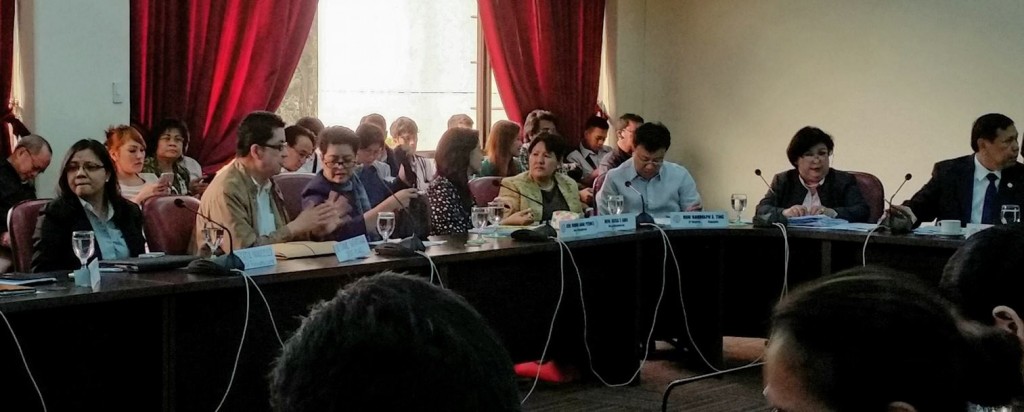Congress proposes law on telehealth, UP NTHC as resource

Photo by Dr. Kristine Mae Magtubo: Dr. Portia Fernandez-Marcelo of NTHC and Dir. Jaime Montoya of DOST-PCHRD sits as resource persons for the committee on health hearing for the Telehealth Act of 2014
QUEZON CITY, PHILIPPINES – Biliran representative Rogelio J. Espina filed a proposal aiming to establish and regulate the practice of telehealth and telemedicine in the country. Dr. Portia Fernandez-Marcelo of the National Telehealth Center (NTHC) sits as a resource person for the House of Representatives Committee on Health hearing today on the House Bill 4199, also called “the Telehealth Act of 2014”, together with Dir. Jaime Montoya of the Department of Science and Technology – Philippine Council for Health Research and Development (DOST-PCHRD).
Telehealth, or the use of telecommunications to deliver health services “has the potential to reduce and improve access to health care in rural and other medically unserved and underserved areas” in the Philippines, as explained by Cong. Espina. The act seeks to establish a comprehensive National Telehealth System that will help deliver efficient and quality health care services especially to far-flung areas.
NTHC, which is under the National Institutes of Health of the University of the Philippines Manila, leads in the research and development of information and communications technology (ICT) innovations for health highly geared towards public service. Currently, NTHC implements the National Telehealth Service Program (NTSP) which supports over 450 doctors-to-the-barrio and municipal health officers nationwide with by providing the capacity to send teleconsultations to urban-based clinical specialists through SMS or Email. “With this, doctors, especially younger ones, will be more confident in treating their patients because they now have access to expert opinion and various specialties even if they’re out in the field,” Dr. Fernandez-Marcelo explained.
The NTSP is also implemented in integration with other eHealth projects of NTHC, such as the RxBox, a 5-in-1 biomedical device co-developed with DOST and UP Diliman, and CHITS (Community Health Information Tracking System), an award-winning electronic medical record homegrown in UP Manila.With the whole system in place, recipient health facilities in 115 sites in 46 provinces are enabled with smarter diagnosis, paper-less and electronic records management, and teleconsultations, leading to less unnecessary hospitalizations, early diagnosis and treatment, and saved lives.
In a meeting yesterday with Cong. Espina, NTHC shed light on the status and concerns regarding telehealth in the country. “The problem is that there is no specialized unit in the government that manages these telehealth services,” Dr. Fernandez-Marcelo said, pointing out the existence of unregulated “telemedicine companies” that may not be adhering to standards. Privacy and ethics should also be considered in the proposed law. These considerations will be further discussed in today’s committee meeting, with NTHC as an integral part of the process.
Cong. Rogelio Espina, also one of the vice-chairpersons of the committee on health, said that seeing patients in remote municipalities die without being given needed medical help inspired him in drafting the bill.

NTHC sheds light on the issues and concerns of telehealth in the country at a pre-committee hearing meeting with Cong. Espina (1/27/2015)